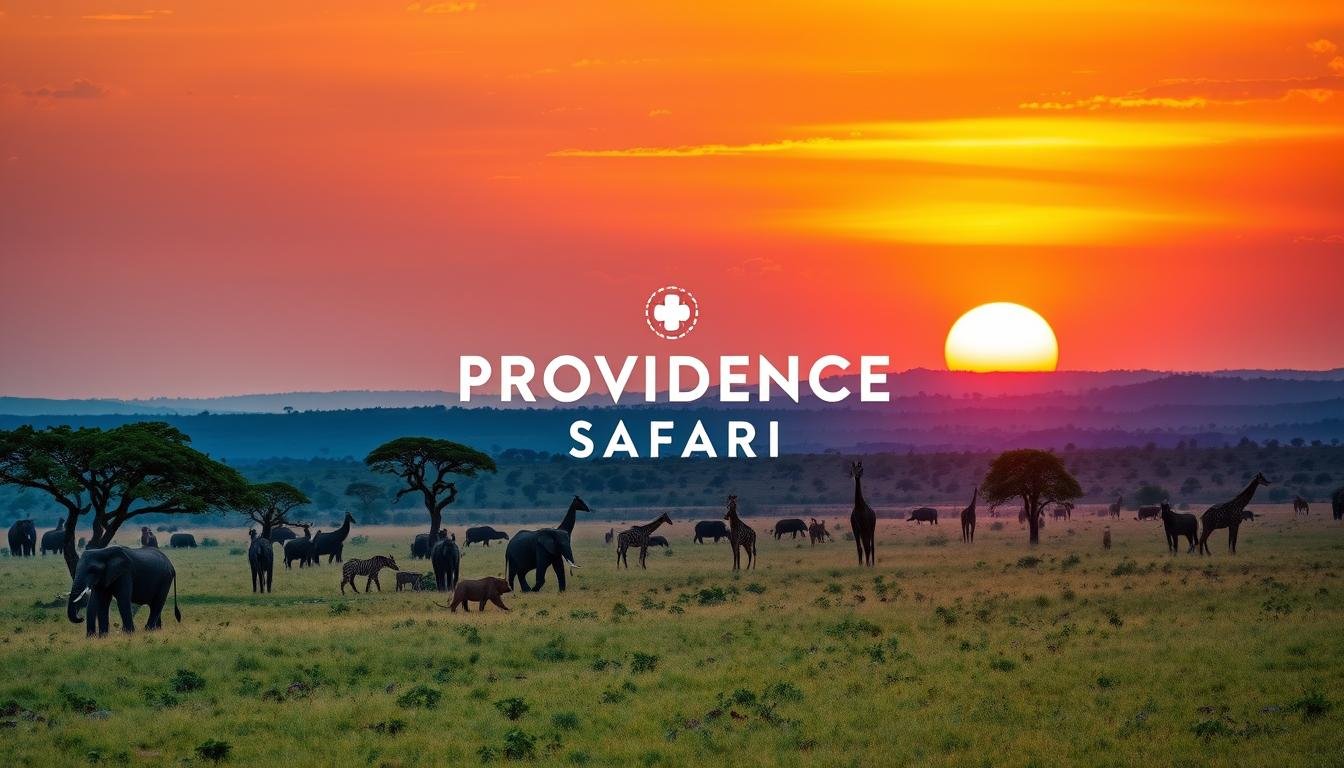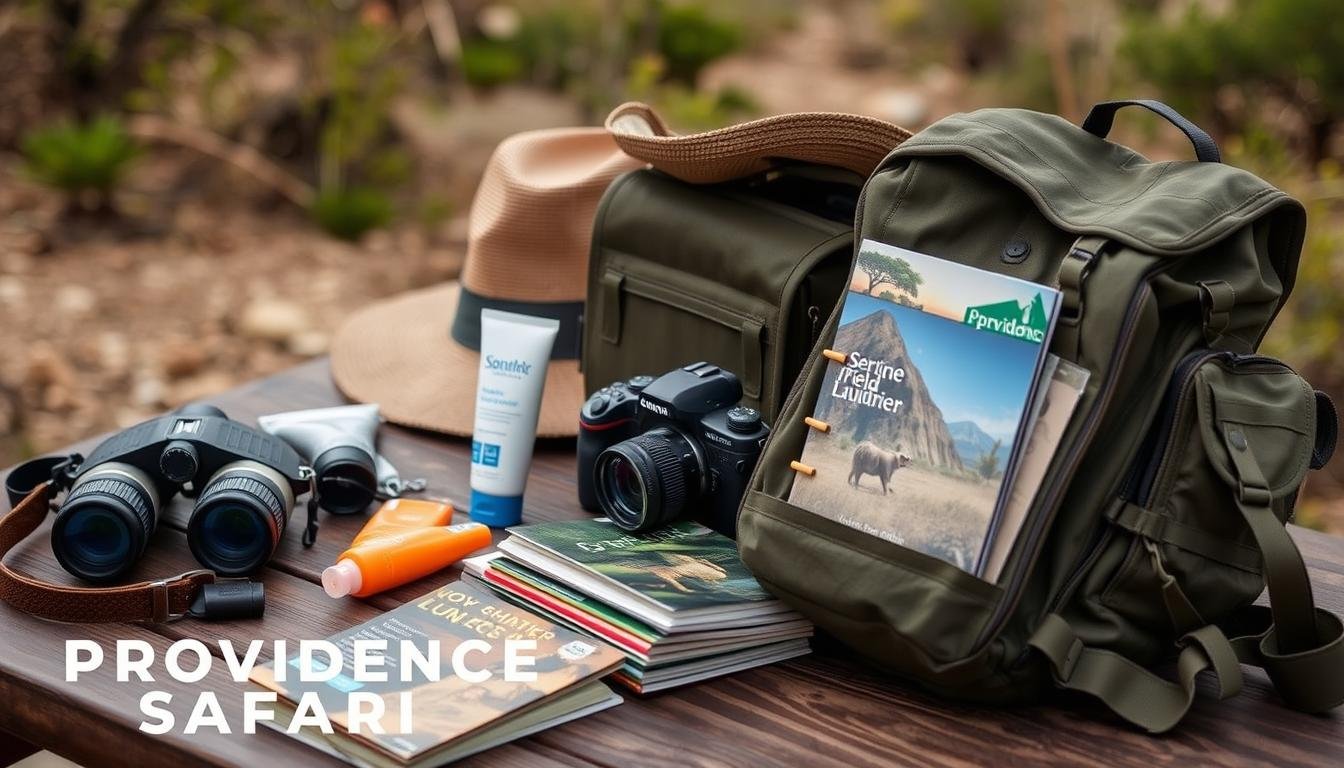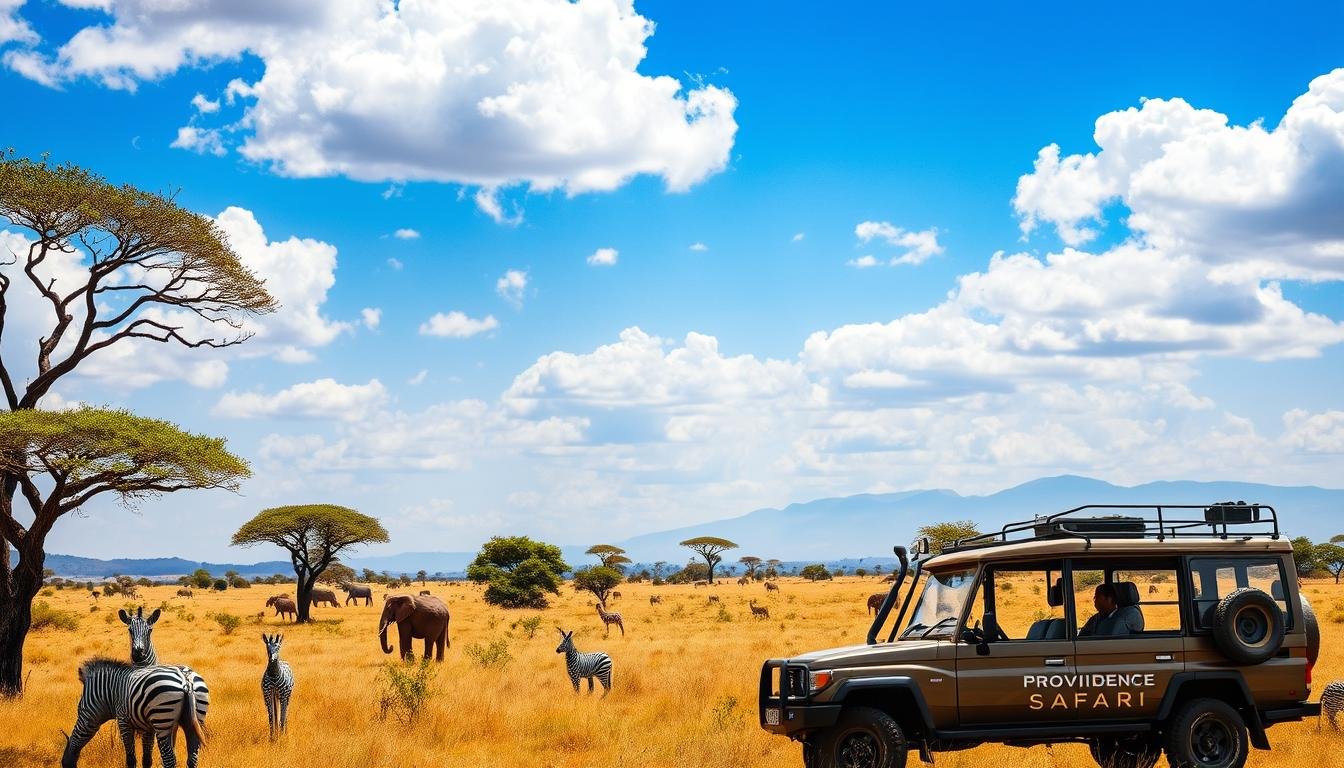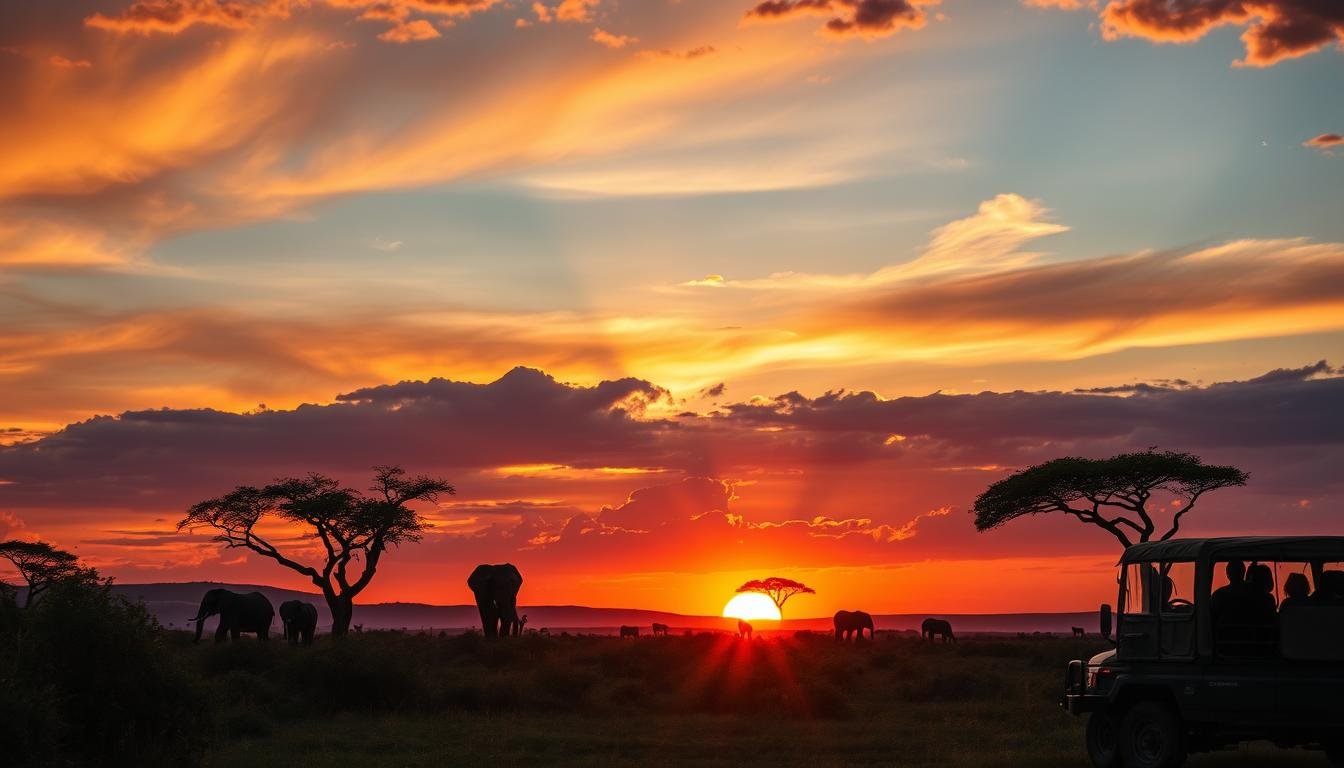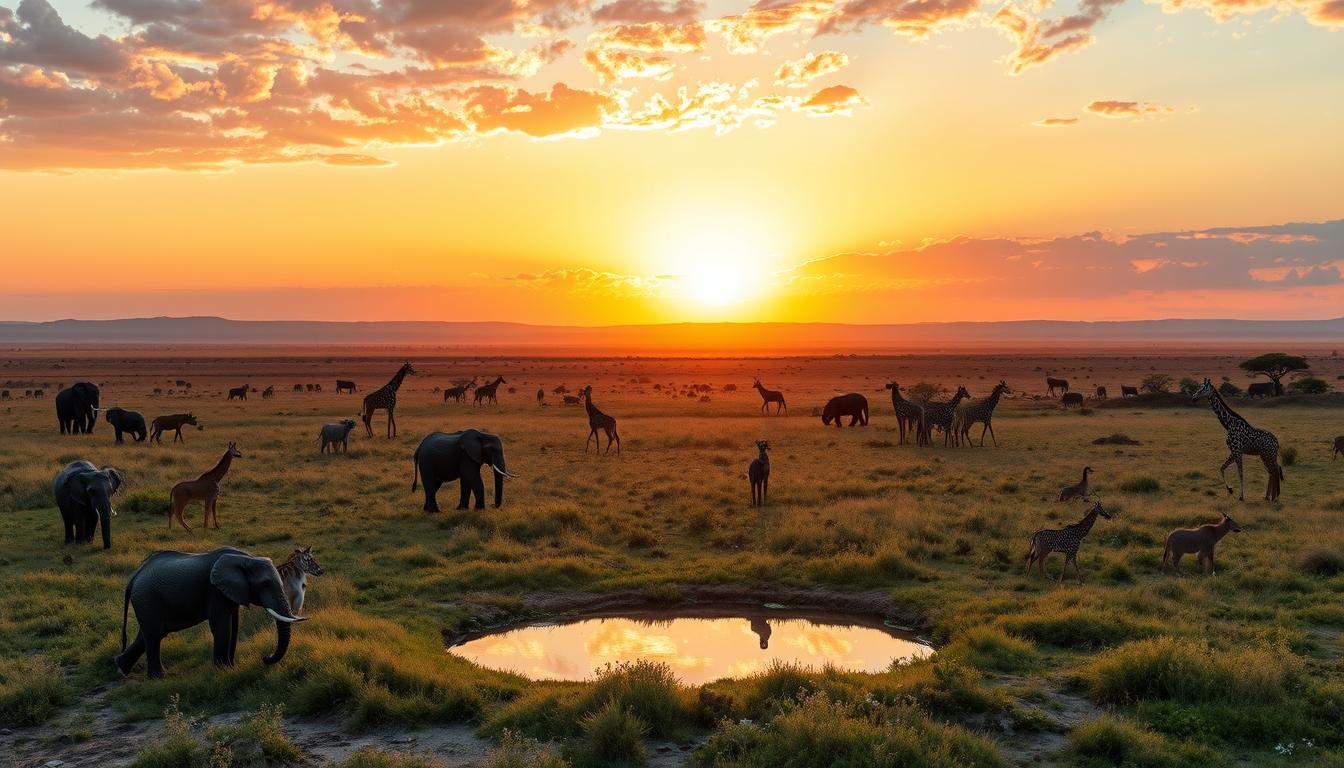Best Country for Safari: Start an unforgettable journey through Africa’s stunning landscapes and varied wildlife. This continent is the perfect place for a safari. From Kenya’s wide savannas to Namibia’s harsh deserts, Africa has many spots for nature lovers and adventure seekers. Here, you can see animals in their natural home.
In this guide, we’ll look at the top safari spots across Africa. We’ll show you what makes each country special for travelers. Whether you want to see the “Big Five” or learn about local cultures, this guide will help you plan your dream safari.
Key Takeaways
- Discover the best countries in Africa for safari experiences, each with its own distinctive charm and wildlife
- Understand the different types of safari activities, from game drives to walking safaris, and choose the one that aligns with your interests
- Learn about the optimal time to visit each safari destination based on wildlife patterns and seasonal considerations
- Explore the top safari parks and reserves, where you can witness the majestic “Big Five” and unique species of each region
- Gather essential tips and insights to ensure a safe, responsible, and memorable safari journey
Introduction to Safari Adventures
Start an unforgettable journey into Africa’s wild heart. Wildlife viewing vacations come alive here. A safari is an immersive exploration of Africa’s vast ecosystems. It offers a chance to see nature’s awe-inspiring spectacle.
What is a Safari?
The word “safari” comes from the Swahili word for “journey” or “travel.” Originally, it was for hunting with guides. Now, it’s about responsible wildlife viewing and photography. Today, safaris are guided tours to see Africa’s natural wonders up close.
The Appeal of Safari Holidays
Safari holidays offer a unique chance to see iconic wildlife in their habitats. You can see elephants roaming and leopards hiding. It’s a once-in-a-lifetime experience. Safaris also let you dive into Africa’s rich culture, deepening your appreciation for its traditions.
Essential Considerations Before Planning
Before your safari, think about your destination, budget, and the best time to go. Africa has different wildlife, landscapes, and cultures. Research to find the right place for you. Knowing the wildlife and climate patterns helps plan the best safari.
Top Countries for Safari Experiences
Africa is the top spot for an unforgettable safari adventure. Countries like Kenya and Namibia offer unique experiences. Let’s look at the best safari destinations for your bucket list.
Kenya: The Home of the Great Migration
Kenya is known as the birthplace of the safari. The Maasai Mara National Reserve is famous for the Great Migration. This natural wonder shows millions of animals migrating across the grasslands.
Tanzania: Serengeti and Ngorongoro Crater
Tanzania is home to the Serengeti National Park and the Ngorongoro Crater. The Serengeti is known for its diverse wildlife. The Ngorongoro Crater is a UNESCO World Heritage Site with many species.
South Africa: Diverse Landscapes and Wildlife
South Africa is a safari powerhouse. It has many wildlife-rich areas, like Kruger National Park and the Kalahari Desert. The country’s diverse landscapes and species make it great for safaris.
Namibia: Unique Desert Safaris
Namibia offers a unique safari experience. It has dramatic desert landscapes, like the Sossusvlei dunes. Here, you can see rare desert species, like black rhinos and Namibian lions.
Planning the ultimate safari? Kenya, Tanzania, South Africa, and Namibia are the top choices. Each offers unique wildlife, stunning scenery, and unforgettable experiences.
Understanding Safari Types
There are many luxury safari tours and wildlife viewing vacations to choose from. Each safari type has its own benefits, fitting different interests and preferences. Let’s explore the various safari options and their advantages.
Game Drives versus Walking Safaris
The game drive is a key part of the safari. It lets you see animals from a safari vehicle, covering a lot of ground. Walking safaris are more exciting and immersive. You walk with guides, getting close to plants and animals.
Photographic Safaris: Capturing Wildlife
Photographic safaris are perfect for those who love taking pictures. They help both new and experienced photographers. You’ll learn how to take amazing photos of the Big Five and other animals.
Luxury Safaris: Comfort in the Wild
Luxury safari tours offer a mix of adventure and comfort. They have fancy lodges, great food, and personal service. This way, you can enjoy Africa’s beauty while being very comfortable.
| Safari Type | Highlights | Ideal For |
|---|---|---|
| Game Drives | Extensive wildlife viewing from a vehicle | Families, first-time safari-goers |
| Walking Safaris | Intimate encounter with nature, guided by experts | Adventure-seekers, nature enthusiasts |
| Photographic Safaris | Specialized guidance for capturing stunning wildlife images | Photographers, both amateur and professional |
| Luxury Safaris | Upscale accommodations, personalized services, and gourmet dining | Discerning travelers, honeymooners |
There’s a safari for everyone, no matter what you like. You can choose from walking safaris, photo tours, or luxury trips. Each offers a unique way to experience Africa’s wildlife.
Best Time to Go on Safari
Planning the perfect safari trip requires knowing the right time. The best time depends on when animals are most active and the weather in the area. This knowledge helps us have a trip filled with amazing sights and great weather.
Wildlife Patterns and Seasons
Every African place has its own animal cycles and migrations. For example, the wildebeest migration in the Serengeti is a must-see from June to October. In East Africa, the dry season from June to October is perfect for spotting animals because they gather near water.
The wet season, from November to May, brings a green landscape and new animal births. It’s a time to see the area change and witness the start of new life.
Considerations for Weather and Climate
- The dry season offers cooler temperatures and less rain, making it the best time for a safari.
- The wet season can be rainy but also shows the area’s transformation and new animal births.
- Humidity, wind, and clouds also affect the safari experience and how well you can see animals.
By thinking about animal patterns and weather in different African places, we can pick the best country for our safari. This way, we ensure our trip is unforgettable and matches our dreams of an ultimate safari adventure.
Popular Safari Parks and Reserves
Africa is home to the world’s top safari parks and best game reserves. Places like the Maasai Mara in Kenya and the Serengeti in Tanzania offer amazing chances to see nature’s wonders. These spots are must-visit destinations for any adventure seeker.
Maasai Mara National Reserve, Kenya
The Maasai Mara National Reserve is in Kenya’s heart. It’s famous for the Great Migration, where millions of animals move in search of food. Here, you can see many animals, including the Big Five and cheetahs, giraffes, and birds.
Serengeti National Park, Tanzania
The Serengeti National Park in Tanzania covers over 5,000 square miles. It’s a paradise for wildlife lovers. You can see the wildebeest migration and visit the Ngorongoro Crater, a UNESCO World Heritage Site.
Kruger National Park, South Africa
Kruger National Park in South Africa is huge and diverse. It’s home to many animals, including the Big Five and African wild dogs. Kruger offers different safari experiences, making it great for both new and experienced safari-goers.
Etosha National Park, Namibia
Etosha National Park in Namibia is known for its salt-pan landscape and wildlife. You can see elephants, black rhinos, lions, and unique desert animals. The waterholes are great for spotting animals as they drink.
Preparing for a Safari Trip
Going on a safari adventure needs careful planning for a memorable trip. You’ll need to pack the right things and know about health and safari rules. This guide will help you prepare for your African journey.
Packing Essentials for Safari
Packing for a safari is all about strategy. To enjoy your safari fully, remember these key items:
- Comfortable, neutral-colored clothing that can withstand the elements
- Sturdy, closed-toe walking shoes or boots
- Sun protection, including hats, sunglasses, and high-SPF sunscreen
- Binoculars to observe wildlife up close
- Camera and extra batteries or chargers
- Lightweight rain jacket or poncho
- Mosquito repellent and antihistamines
- Personal medications and first-aid supplies
Health Precautions and Vaccinations
Your health and safety are crucial for a great safari. Before you go, talk to a doctor about:
- Recommended vaccinations, such as yellow fever, hepatitis A and B, and tetanus
- Malaria prevention measures, including antimalarial medications
- Any necessary travel health insurance or medical evacuation coverage
Understanding Safari Etiquette
To enjoy your safari fully and respect the wild, learn and follow safari rules. Key points include:
- Maintaining a quiet demeanor to avoid disturbing the wildlife
- Staying within designated game drive paths and not venturing off-road
- Refraining from littering or leaving any trace of your presence
- Respecting the local culture and customs of the communities you visit
By following these tips, you’ll have a safari that’s both unforgettable and respectful. It will show you the true beauty and wonder of Africa.
Wildlife to Expect on Safari
Going on a wildlife viewing vacation in Africa is exciting. You’ll see many iconic safari animals. From the “Big Five” to unique regional species, it’s an experience you won’t forget.
The Big Five: Lions, Leopards, Elephants, Rhinos, Buffalos
The “Big Five” – lions, leopards, elephants, rhinos, and buffalos – are top sights on any African safari. These animals have amazed wildlife lovers for years. Seeing them in the wild is a special treat.
Unique Species of Each Region
Every safari spot in Africa has its own special animals. In Kenya’s Maasai Mara, you might see giraffes and cheetahs. Tanzania’s Serengeti is famous for the wildebeest migration. Namibia’s desert is home to desert elephants and black-maned lions. South Africa’s Kruger National Park has zebras and wild dogs.
Seasonal Animal Behavior
The time of year affects wildlife viewing. In the dry season, animals are easier to find because they gather at water sources. In the wet season, the landscape changes, and you might see animals nesting or giving birth. Knowing when to go can make your wildlife viewing vacations in Africa even better.
| Destination | Unique Wildlife |
|---|---|
| Maasai Mara, Kenya | Giraffes, Cheetahs |
| Serengeti, Tanzania | Wildebeest Migration |
| Etosha National Park, Namibia | Desert-adapted Elephants, Black-maned Lions |
| Kruger National Park, South Africa | Zebras, Wild Dogs |
Travel Logistics for Safari
Planning a luxury safari tour to Africa needs careful planning. You must choose the right tour operator and understand visa requirements. Every detail matters for a great safari experience.
Choosing the Right Tour Operator
For luxury African safari destinations, your tour operator is key. Look for companies known for excellent service and safaris. Check reviews, ask for references, and make sure they fit your needs and budget.
Transportation Options and Recommendations
Transportation varies in luxury safari tours. Some offer private 4x4s, others shared vehicles. Think about comfort, privacy, and access to far-off places. Also, know about airport transfers, flights, and ground transport to enhance your safari.
Visa Requirements for African Countries
- Getting the right visas for your African safari destinations is vital. Each country has its own rules, so research early. This avoids any last-minute issues.
- Some places, like Kenya and Tanzania, have e-visas. Others need you to apply in person. Make sure you have all needed documents and plan ahead to avoid delays.
By carefully planning your travel, you’re set for an amazing luxury safari tour in Africa.
Budgeting for a Safari
Planning a safari adventure can be thrilling but also challenging, especially when it comes to budgeting. The cost of a safari varies a lot. It depends on the type of experience you want, from luxury tours to more affordable options. We’ll explore safari costs and compare different choices to help you find the best fit for your budget and travel plans.
Overview of Safari Costs
The cost of a safari trip depends on several factors:
- Accommodation – From luxury lodges to simple tented camps or budget hotels.
- Transportation – You can choose private vehicles, shared game drives, or internal flights to remote areas.
- Activities – Includes guided walks, wildlife viewing, cultural experiences, and more.
- Meals and beverages – Can range from all-inclusive to a la carte options.
- Permits and fees – Covers national park entry fees, conservation levies, and other costs.
Luxury vs. Budget Safari Options
Travelers have many options when budgeting for a safari:
- Luxury Safari Tours – Offers top comfort, service, and exclusivity. Includes premier lodges, private drives, and fine dining. It’s pricier but provides a unique, personalized experience.
- Budget Safari Options – More affordable choices might have shared drives, basic stays, and focus on the core safari experience. Great for those on a tight budget or wanting a closer-to-nature adventure.
Choosing between luxury and budget safaris depends on your preferences, travel style, and budget. Knowing the options and costs helps you plan a safari that meets your needs and expectations.
Safety Tips for Safari Trips
Going on a safari is a dream for many. But, it’s important to follow safety tips for a good time. This guide will help you stay safe and enjoy your safari.
Personal Safety Guidelines
Your safety is key when exploring the African wilderness. Here are some important tips:
- Always listen to your safari guide. They know how to keep you safe.
- Stay in the safari vehicle or walking areas. Going off alone can be dangerous.
- Don’t wear bright colors or strong smells. They can attract animals.
- Have a reliable GPS or satellite phone. It’s good for staying in touch in remote places.
- Know the safari camp’s emergency plans. Be ready to follow them if needed.
Wildlife Interaction Precautions
Meeting the wildlife is a big part of the safari. But, it must be done carefully. Here’s how to do it right:
- Never go near or try to get wild animals to come to you. They can be unpredictable.
- Keep a safe distance from animals, as your guide suggests. This keeps everyone safe.
- Don’t make sudden moves or loud noises. It can scare the animals.
- Don’t feed the wildlife. It’s bad for them and can make them aggressive.
- If an animal comes close, stay calm. Follow your guide’s advice on what to do.
By following these safety tips, you can have a great safari. You’ll respect the animals and stay safe. With the right steps, you’ll enjoy the African wilderness and make unforgettable memories.
Cultural Experiences on Safari
Going on an African safari is more than just seeing amazing wildlife. It’s a chance to dive into the rich culture of the continent. You can meet local communities and join in on lively cultural festivals. This makes your safari journey unforgettable.
Engaging with Local Communities
Meeting the indigenous people is a big part of the safari experience. Many tours include visits to local villages. Here, you can learn about their traditions and even join in on cultural activities.
These interactions help you understand the area better. They also create strong bonds with the people who live in these african safari destinations.
Cultural Festivals and Events
Visiting during local festivals adds excitement to your safari. You’ll see colorful music, dance, and traditional ceremonies. These events show the beauty of African culture.
By attending these festivals, you get to see old traditions live on. It’s a way to appreciate the unforgettable safari experiences Africa offers.
Embracing the cultural side of a safari makes your trip special. It’s a chance to connect with locals and celebrate their traditions. This enriches your journey and helps keep these traditions alive.
Sustainable and Responsible Safari Tourism
When we look for the best game reserves and amazing wildlife viewing vacations, we must act responsibly. We should support sustainable and eco-friendly tourism. This way, we help keep Africa’s natural beauty alive and support local people.
Benefits of Eco-friendly Safaris
Choosing eco-friendly safari tours is good for the planet and makes our trip better. These tours aim to reduce their impact on the environment. They also help protect wildlife and support local communities. With Altezza Travel, we know our safari trip is helping the planet.
Supporting Conservation Efforts
We can do more than just pick eco-friendly safari operators. We can also help conservation efforts while traveling. Here are some ways:
- Joining volunteer programs to protect wildlife and restore habitats
- Visiting places focused on animal care and research
- Talking to local communities to learn about their green practices and support them
By choosing sustainable tourism, we make unforgettable memories. We also help protect Africa’s wonders for future generations.
Testimonials and Experiences from Safari-goers
Going on a safari is a dream for many. From the start, we dive into a world full of amazing wildlife, stunning landscapes, and rich cultures. Here, we share the stories and lessons from those who have explored the heart of the ultimate safari adventure.
Personal Stories from Our Safari Adventures
“Our safari in Tanzania was truly a once-in-a-lifetime experience. Witnessing the annual wildebeest migration in the Serengeti was a sight that will forever be etched in our memories. The sheer number of animals and the raw power of nature left us in a state of pure wonder.” – Sarah, a seasoned traveler from New York.
“The walking safari in Namibia’s Etosha National Park was a highlight of our trip. Being able to observe the wildlife up close, while learning about their behavior and the delicate ecosystem, made for an incredibly immersive and educational experience.” – Michael, a nature enthusiast from California.
Lessons Learned on the Trail
- Embrace the unpredictability of the wild. Each safari is unique, and being open to unexpected encounters is the key to creating unforgettable memories.
- Respect the local culture and customs. Engaging with the indigenous communities and learning about their traditions can enrich the safari experience.
- Pack light and be prepared. Traveling with the essentials and being adaptable to the changing conditions can make all the difference in the comfort and enjoyment of the safari.
- Capture the moments, but be present. While photography is a fantastic way to preserve the memories, it’s important to take the time to truly immerse oneself in the beauty and wonder of the safari.
The stories and experiences of safari-goers show the power of these adventures. Whether it’s seeing wildebeests migrate, meeting majestic wildlife, or learning about local cultures, these lessons can inspire and guide others on their safari journey.
Conclusion: Choosing the Best Country for Safari
Exploring Africa’s diverse safari experiences shows each country has its own charm. From Kenya’s Great Migration to Namibia’s desert, the choices are amazing. But, the best country for your safari depends on what you want and your travel plans.
Summarizing Our Safari Insights
We’ve found what makes top safari spots special. Kenya and Tanzania have the Serengeti and Maasai Mara. South Africa’s Kruger National Park offers a wide range of wildlife and views. Namibia’s desert safaris are unique, and each place has its own cultural experiences.
Final Recommendations and Tips
Choosing the best country for your safari means thinking about your travel style, budget, and what you want to see. Look into the seasons and weather, and pick a good tour operator for a smooth trip. Remember, the real magic of an African safari is the journey itself. So, be open to new things and make memories in your chosen spot.

